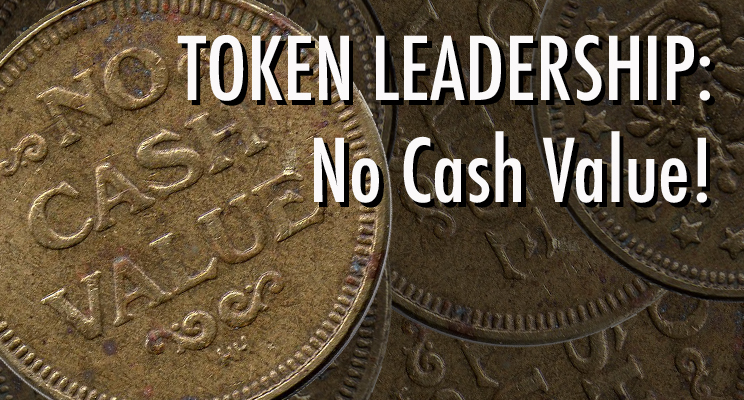Token Leadership: No Cash Value!
/I’ll be honest; one of the worst things about being a parent is having to go to themed pizza eateries where you pay exorbitant prices for mediocre pizza and tons of money on games to win prizes for your kids that are worth pennies! It is the great token trap! And it occurs far more often in corporate leadership training programs than anywhere else!
The entire idea behind the ‘no cash value’ token is to get you to spend money. You purchase a set number of tokens that can only be used at the establishment that utilizes the token. You can’t cash them in, nor can you transfer them to the next restaurant you visit. Once you have the tokens, you are stuck. You must utilize them all during your visit or chalk them up as a loss.
The same is true for many leadership training programs. They really aren’t leadership training programs, but rather token programs that give you tips and tools to utilize in your current role, but do little to truly move you forward as a leader. They are not transferable and have no cash value.
Effective leadership programs teach leadership principals that are applicable in any leadership role. They are concerned with investing in you as a person over investing in your position. They give you the tools and skills to advance where ever you go and in whatever you do.
Effective leadership embraces the philosophy of working yourself out of a job. You train someone up to assume your position so you can go do bigger and better things. Yet, most leadership training, while lauding itself as a growth opportunity, is actually a litmus test that limits peoples ability to advance. The programs are more concerned with whether or not you will tow the line than opening doors to new possibilities.
This is why so many people when being let go from a company after spending years in that corporation’s programs find themselves lost when seeking a new job. It is why companies state that they have their own training program for the position. It is a cog mentality which seeks to invest in a position rather than a person.
Honestly, there is nothing overtly wrong with that, but don’t call it leadership! Leadership is about people not positions. Leadership is investing in the individual rather than the position. Leadership is transferable across positions, corporations, industries and even into your personal life. Leadership is about being and that drives what you are doing.
Most corporate “leadership” programs are about doing and have little interest is who you are as an individual. Let’s call them what they are; they are cog training courses, not leadership training. And they have no cash value because they do not transfer to other companies, organizations or your life outside of work.
If you are not investing in the lives of your team members, you are providing token leadership. Real leadership is enabling them with the life skills to leave you and do it on their own. Then if they stay, you have a team that is positioned to do the extraordinary.
In marriage counseling, I often tell spouses they should work to enable each other to live on their own rather than in dependence on the other. Then, if they choose to live with each other, even though they could do it on their own, you have a strong relationship built on choice not need.
Most companies can’t grasp that concept. They develop programs that hold employees hostage by the need they have for the job rather than empowering them. But building leaders creates loyalty. Building positions creates animosity.
It is my passion that every employee that works under me leaves with skills and abilities that move them closer to their life goals. If I’m not giving them the leadership training they need to be better people when they leave, then I’m just another cog that is providing token leadership! If I am developing their leadership abilities and they choose to stay, then I not only have a competent worker, but a loyal team member and friend!
————————————
Coaching and training is available from. Contact Warren Martin for more information.
————————————
About Warren Martin
WARREN MARTIN is a philosophy graduate of Texas Tech University. He is an author, teacher, minister, artist, quasi-philosopher and speaker known for his unique teaching style. His passion is to share the grace of Christ and to inspire & invest in the next generation of leaders. Learn more here...
© 2018 Warren Martin. All Rights Reserved.






















